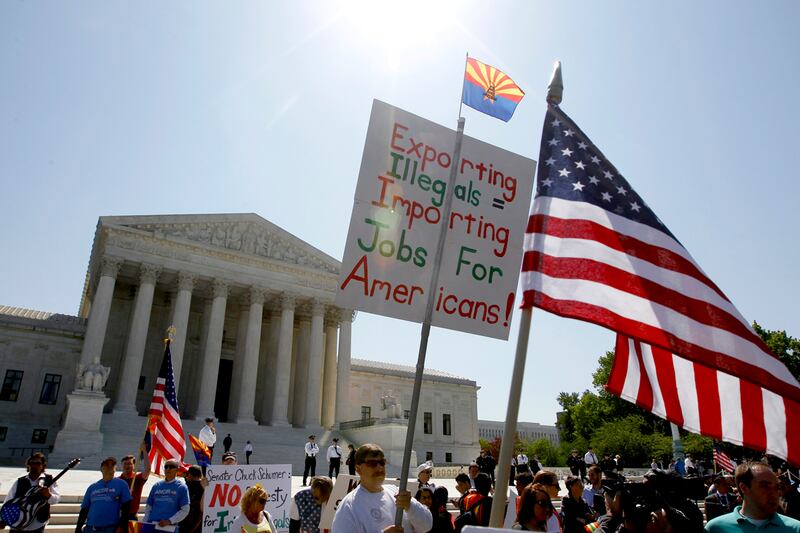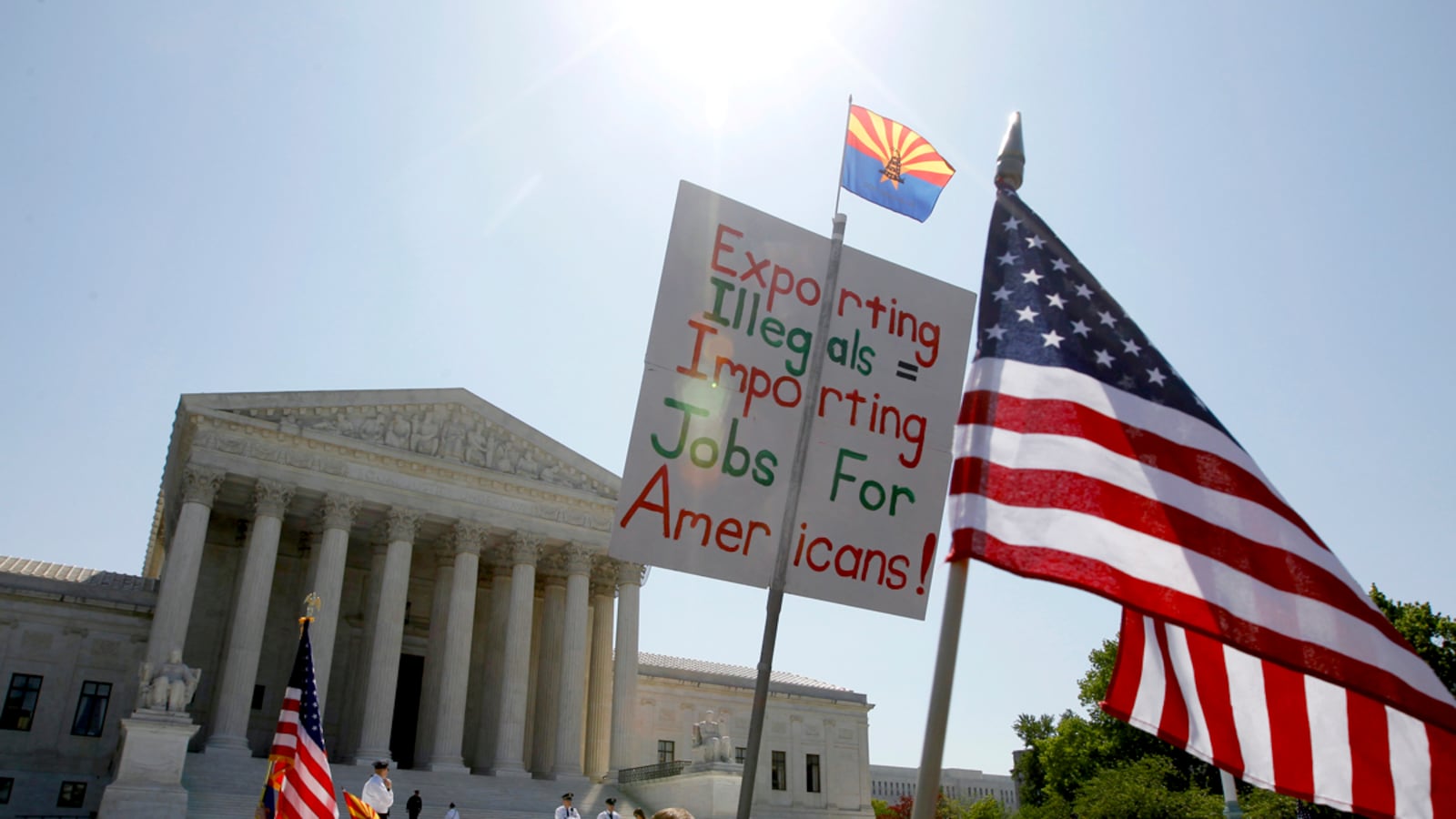As hundreds of Latinos crowded in front of the U.S. Supreme Court on Wednesday and chanted opposition to Arizona’s immigration law, it got a partial constitutional airing in what appeared to be a humiliating slap-down of the U.S. solicitor general.
Arizona’s SB 1070 case, along with another on the Affordable Care Act heard by the court earlier this year, are two landmarks that will shape the Obama administration’s legacy. In both cases, Solicitor General Donald Verrilli faced off against Paul Clement, a former solicitor general who frequently appears before the court. On Wednesday, Verrilli lost focus and failed to drive home key points as he was questioned by conservative justices and gently rebuked by liberal justices. At one point, Justice Sonia Sotomayor told Verrilli she was “terribly confused” by his answer; at another, she noted: “Your argument isn’t selling very well.”
The SB 1070 case is expected to produce guidelines for future immigration enforcement. But it is also about civil rights, said Clarissa Martinez de Castro, director of National Council of La Raza’s civic engagement and immigration department. “That’s how the Latino community not only has seen it but also have been feeling it,” she said. “Many times,” she added, when cases “move inside the courtroom,” they are “sterilized beyond recognition and the implications are masked.”
Jack Chin, a law professor at the University of California-Davis who left Arizona in the wake of SB 1070—the state’s “politics are a little too exciting for me,” he said—is widely considered a national expert on the Arizona law. “It would be best for SB 1070 to be held unconstitutional,” he said in a pre-hearing phone interview, adding, “There’s no rational economic or social explanation for the law to exist.”
The Arizona law is designed to drive undocumented people out of the state via a stated policy called “attrition through enforcement.” It was drafted in large measure by the Immigration Reform Law Institute, a legal group affiliated with the Federation of American Immigration Reform, which seeks to restrict immigration to about 330,000 people annually. FAIR was dubbed a “nativist hate group” by the Southern Poverty Law Center several years ago. Outside the courthouse Wednesday, Jack Martin, FAIR’s special projects director, expressed his support for SB 1070 and called the SPLC's hate-group designation “schoolyard name calling.”
On Wednesday, the court heard arguments over four key provisions of SB 1070 that had been enjoined, or temporarily prevented from taking effect, by a federal judge in Phoenix in an ongoing lawsuit filed by the Obama Justice Department against Arizona. The law requires all Arizona police officers to check immigration status of those they stop, detain, or arrest if they “reasonably” suspect the person is in the country illegally. The legal argument centers on whether the state is unconstitutionally meddling in federal law.

The Phoenix case hasn’t been fully litigated yet, but in light of all the state immigration laws passed in the wake of the Arizona law, the court decided to weigh in on whether the enjoined provisions should be allowed to take effect. Most of the questioning on Wednesday concerned the first provision, which is the true heart of SB 1070: the requirement that police check the immigration status of every person they stop, detain, or arrest if they reasonably suspect the person is undocumented.
Clement confidently assured the court that this provision of the law is constitutional because the state only asks its police officers to check immigration status with the federal authorities and alert them about undocumented detainees. But if the federal government does not want to deport the immigrants, the state cannot. It is a cooperative endeavor, he said, completely constitutional. The Georgetown law professor didn’t buckle under questioning from liberal justices, who wondered aloud whether all those stops, detentions, and arrests might drag on so long they could violate the Fourth Amendment, which guards against unreasonable searches and seizures. He assured them Arizona would not violate the Fourth Amendment.
Verrilli, on the other hand, was sucker-punched even before he started his argument by Chief Justice John Roberts, who asked if the case was related to ethnic profiling.
No, Verrilli said.
That was the first blow for civil-rights groups and Latinos who had filed amicus briefs contending that SB 1070, when carried out, will unleash a number of unconstitutional ills: racial profiling, hampering the government’s ability to do its job, and violating the civil rights of victims of hate crimes and domestic violence who fear speaking out because of possible immigration-status checks.
The solicitor general contended that SB 1070 is unconstitutional because immigration is a federal responsibility—in no small part because the treatment of immigrants affects foreign relations. What’s more, he sought to say, the state law hampers the federal government’s ability to conduct immigration enforcement. But Verrilli allowed himself to wander under questioning from conservative justices, and at one point the gentlemanly Justice Stephen Breyer said, “Let’s get focused.”
Elena Kagan has recused herself from the case, so only eight justices will weigh in. There’s a theoretical possibility of a full-board tie, in which case the enjoined provisions would hold. But three conservatives will likely vote to lift the injunctions, two liberals will probably oppose them, and there’s no telling how on-the-fence Justices Samuel Alito and Anthony Kennedy will fall.
As Verrilli addressed the panel of justices in the court's great hall, Thomas Perez, the Justice Department attorney who has accused Maricopa County Sheriff Joe Arpaio’s office of racial profiling and will likely file a lawsuit against it, sat stony-faced. Perez was across the aisle from two former Immigration and Naturalization Service commissioners, Doris Meissner and James Ziglar, who filed an amicus brief opposing Arizona’s law on the grounds that it impedes the federal government from carrying out its plans for immigration enforcement. Arizona Gov. Jan Brewer, dressed in a black pantsuit, sat with her son in the front row of the middle section of the courtroom. And Arizona’s state Sen. Steve Gallardo sat in front of the INS heads, while SB 1070’s sponsor, Russell Pearce, a state senator who was successfully recalled by Latinos, was in the far-right section.
After the hearing, Pearce and Brewer were jubilant, voicing optimism that the court would overturn four provisions and it would be allowed to go forward. “This is a great day for Arizona and the nation,” Pearce said.
If he’s right, SB 1070 will be his second Supreme Court immigration-law victory. The court earlier this year upheld the so-called Employer Sanctions Law, which punishes employers who hire unauthorized immigrants by taking away their business licences. Although few businesses have been sanctioned in Arizona, Sheriff Arpaio has used the law frequently as a reason to round up unauthorized immigrants in workplace raids. The law was found constitutional because it utilized a state-licensing loophole.
Walking out of the courthouse, a grim-faced Danny Ortega, chairman of the National Council of La Raza and a Phoenix lawyer, said the court may well let the heart of SB 1070 take effect.
“Although people will tell you this case is about pre-emption,” he said, “it’s really about civil rights.”
The court is expected to issue a decision in late June.





